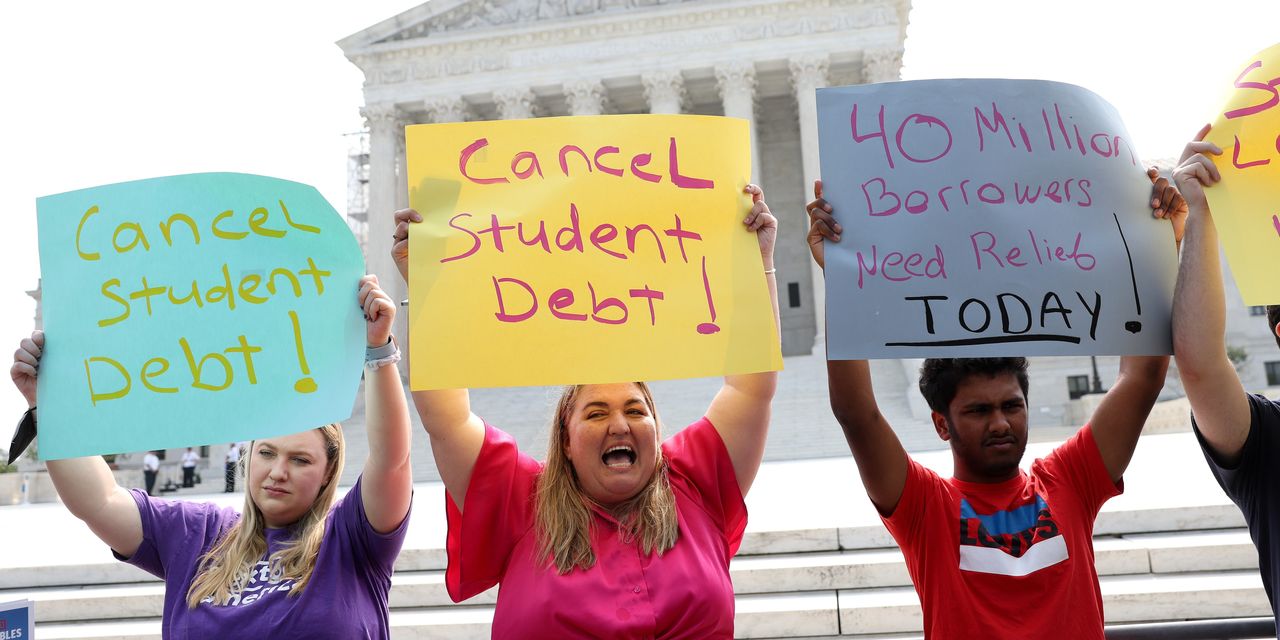In the wake of the Supreme Court’s decision to block the Biden administration’s student-loan forgiveness plan, advocates and some lawmakers are pressuring the White House to find another way to cancel student debt en masse.
On Friday, the court’s conservative majority blocked the White House’s plan to cancel up to $20,000 for a wide swath of borrowers. The Department of Education had rested its authority to carry out the plan on the HEROES Act, a 2003 law that allows the secretary of education to waive and modify student loans in a case of national emergency.
Also read: After Supreme Court ruling, a warning: Missing just one student-debt payment can hurt your credit score
The court ruled the HEROES Act didn’t authorize the secretary to cancel student debt en masse. But for years, advocates and lawmakers have said the executive branch has other tools. In the wake of the decision, they’re ramping up pressure on the Biden administration to use them.
“This is about the HEROES Act and this is about the use of the HEROES Act,” Persis Yu, managing counsel and executive director of the Student Borrower Protection Center, an advocacy group, said of Friday’s decision. “We have the rest of the Higher Education Act still available in order to make sure that borrowers get relief. What we are calling on this administration to do now is to go ahead and use the other provisions of the Higher Education Act to deliver on the relief that Biden has promised.”
Advocates have been especially focused on one plank of the Higher Education Act they say allows the Department of Education to “compromise, waive, or release” any right to collect on student debt. Luke Herrine, an assistant professor at the University of Alabama School of Law who was involved in founding the Debt Collective, a debtor activist organization, has been writing for years about the authority.
Now see: The Supreme Court just blocked student-loan cancellation. Here’s what happens next for your loans.
“The Biden administration must use all other legal tools at their disposal to deliver student-debt relief and fulfill his campaign promise,” Braxton Brewington, the spokesperson for the Debt Collective, said in a statement following the decision. “It won’t be acceptable for Biden to point to the Supreme Court as the reason he can’t deliver on relief—he’ll need to fight every step of the way.”
During the 2020 presidential campaign, Sen. Elizabeth Warren, a Massachusetts Democrat, said she would use the compromise and waive provision to cancel up to $50,000 in student debt for a large share of borrowers on day one of her presidency. After the decision, Warren said again that the executive branch has the power to discharge student debt en masse.
“This fight is not over,” Warren said in a statement. “The President has more tools to cancel student debt — and he must use them. More than 40 million hard working Americans are waiting for the help that President Biden promised them, and they expect this administration to throw everything they’ve got into the fight until they make good on this commitment.”
In a statement, President Joe Biden also told Americans that “this fight is not over.” He said he believed the court’s decision is “wrong,” and said he’d announce more Friday afternoon on his administration’s next steps.
“I will stop at nothing to find other ways to deliver relief to hard-working middle-class families,” he said.
Over 16 million borrowers had applications approved to have their debt canceled, before officials were blocked by litigation from carrying out the plan.
“Most certainly the president needs to deliver on the borrowers who have already been promised relief,” Yu said. “Those borrowers who have received emails who said you are approved for debt cancellation. They need to have relief immediately.”
During oral arguments in the student loan cases in February, J. Michael Connolly, the attorney representing two student loan borrowers suing over the debt-relief plan, acknowledged that the Higher Education Act gives the Department of Education the authority to cancel student debt.
“The parties are in agreement that they have the power to do this,” Connolly said of the debt forgiveness. “Under the HEA.”
Still, using the authority successfully could pose challenges. The Higher Education Act requires the Department of Education to submit regulations for notice and comment. That would likely hold up any debt cancellation initiative and allow time for opponents to sue once again.
Meanwhile, Republican presidential candidates praised the Supreme Court on Friday for blocking Biden’s student-loan forgiveness plan.
Read the full article here




